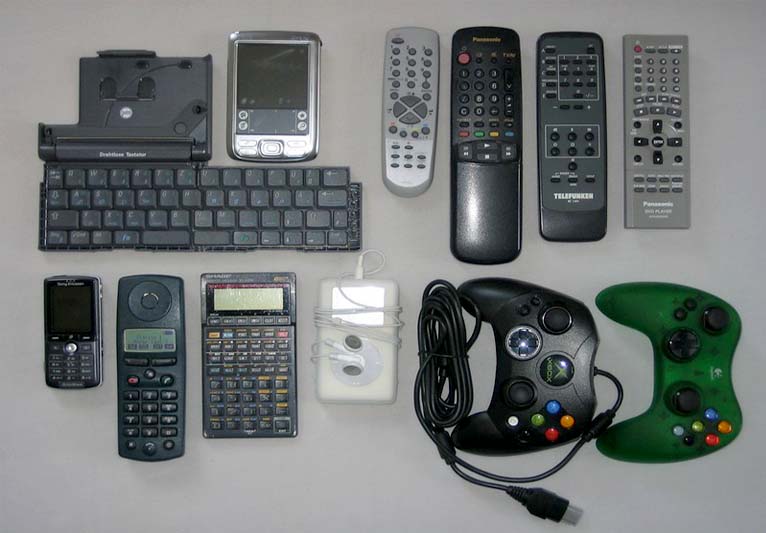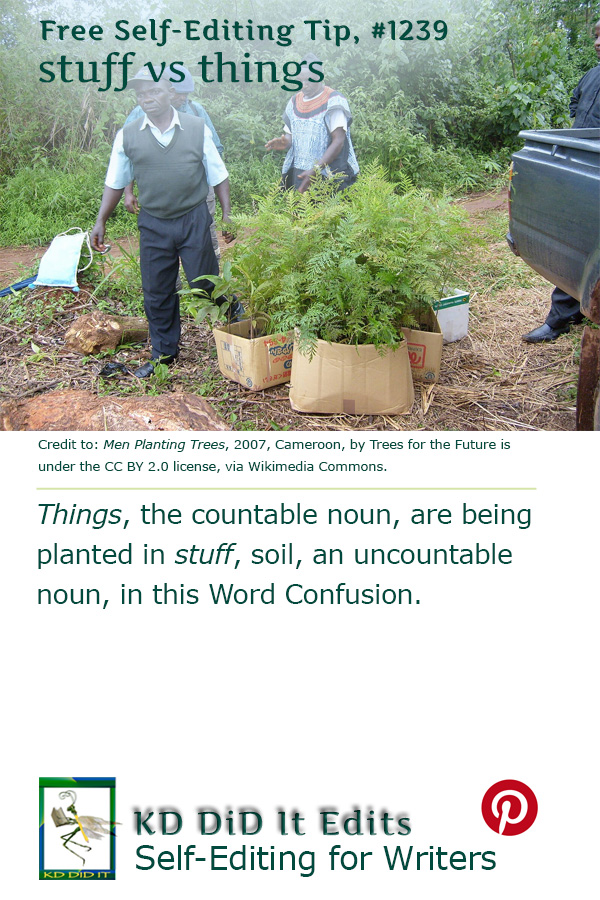It was a conversation that set me off on this word confusion stuff versus things. A friend mentioned all my stuff, and I responded asking about all her things. Was there a difference?
Yes. And no.
Stuff is both uncountable noun and verb.
Things is a countable noun.
The difference is minute. Stuff can’t be counted. Things can be counted, otherwise they’re the same. Okay, well a minute. Stuff doesn’t have the variations that things does. Whenever you can’t name something or remember what it’s called, it turns into that thingy or a thingamabob. Stuff is just . . . stuff.
” If you have so many things that you can’t count them all, and you have to stuff them all into cupboards and boxes, you probably have too much stuff” (Common).
Word Confusions . . .
. . . started as my way of dealing with a professional frustration with properly spelled words that were out of context in manuscripts I was editing as well as books I was reviewing. It evolved into a sharing of information with y’all. I’m hoping you’ll share with us words that have been a bête noire for you from either end.
If you found this post on “Stuff versus Things” interesting, consider subscribing to KD Did It, if you’d like to track this post for future updates.
| Stuff | Things |
|---|---|

Old Vintage Stuff by spline splinson is under the CC BY 2.0 license, via Wikimedia Commons. |

Things with Buttons by Niels Heidenreich is under the CC BY 2.0 license, via Wikimedia Commons. |
| Part of Grammar: | |
| Noun; Verb, intransitive & transitive
Plural for the noun: stuff Third person present verb: stuffs |
Morpheme: thing
Noun, plural |
| Noun: Matter, material, articles, or activities of a specified or indeterminate kind that are being referred to, indicated, or implied
The basic constituents or characteristics of something or someone [British English; dated] Woolen fabric, especially as distinct from silk, cotton, and linen [North American English; in sports] Spin given to a ball to make it vary its course [Baseball] A pitcher’s ability to produce spin on a ball or control the speed of delivery of a pitch Verb, intransitive:
Verb, transitive:
[British English; informal; usually in imperative] Used to express indifference toward or rejection of (something) [British English; informal] Defeat heavily in sport [British English; vulgar slang; of a man] Have sex with (someone) |
Noun: An object that one need not, cannot, or does not wish to give a specific name to
An inanimate material object as distinct from a living sentient being
An action, activity, event, thought, or utterance
[Informal; the thing] What is needed or required
[Informal; one’s thing] One’s special interest or concern [Informal; the thing] Used to introduce or emphasize an important point |
| Examples: | |
| Noun: She’s good at the technical stuff. A pickup truck picked the stuff up. He took his stuff and went. Oh, that’s stuff and nonsense! The islanders get fighting mad on the stuff. “Are you doing stuff, Kevin?” he asked. He knows his stuff and can really write. Healey was made of sterner stuff. Such a trip was the stuff of his dreams. She wore her dark stuff gown. “There is stuff, and there’s what the pitcher does with the stuff: location, sequence, timing, trickery” (Scocca). “A curveball is good stuff if it curves hard” (Scocca). Verb, intransitive: His pants were stuffed inside the tops of his boots. “There are just two suites, both overlooking the sea, stuffed with antiques and marble trims” (Sunday, 2015). Verb, transitive: His head has been stuffed with myths and taboos. He stuffed a thick wad of cash into his jacket pocket. Sadie took the coin and stuffed it in her coat pocket. He took the bird to a taxidermist to be stuffed. She made a chicken stuffed with mushrooms and breadcrumbs. He stuffed himself with potato chips. They spent the whole time in a back room stuffing envelopes. They learned they had not stuffed the ballot boxes. Stuff the diet! Town got stuffed every week. Henry claimed that he’d stuffed her. |
Noun: Look at those metal rail things over there. There are lots of things I’d like to buy. She had too many things to wear. She began to unpack her things. They cleared away the lunch things. She couldn’t find a thing to wear. You won’t find me smoking those filthy things. It was crazy, his love for all things Italian. Did you see the size of his thing! I’m not a thing, not a work of art to be cherished. The sea is the primal source of all living things on earth. Have a nice weekend in the country, you lucky things! The lambs were puny little things. She said the first thing that came into her head. The only things I could do well was cook and garden. Things haven’t gone entirely according to plan. How are things with you? Mourning and depression are not the same thing. They had one thing in common — they were men of action. These two games are the latest things in family fun. Your being here is just a friendship thing, OK? Phil and Lisa had been having a thing. According to media reports, things are heating up in Gaza. He looks like he’s wearing boxers underneath his trunks (is that a thing?) You need a tonic — and here’s just the thing. It wouldn’t be quite the thing to go to a royal garden party in boots. Football isn’t my thing. The thing is, I am going to sell this house. Here’s the thing: This is a story, not a piece of hard news. That’s the thing about style — no two people are completely alike. |
| Derivatives: | |
| Adjective: stuffed Noun: stuffer, stuffing |
Noun: thingamabob, thingamajig, thingamy, thingumabob, thingumajig, thingummy, thingy |
| History of the Word: | |
| Middle English denoting material for making clothes, a shortening of the Old French estoffe meaning material, furniture, estoffer meaning equip, furnish, from the Greek stuphein meaning draw together. | Old English þing, þyng, is of Germanic origin and related to the German Ding. Early senses included meeting and matter, concern as well as inanimate object. |
C’mon, get it out of your system, bitch, whine, moan . . . which words are your pet peeves? Also, please note that I try to be as accurate as I can, but mistakes happen or I miss something. Email me if you find errors, so I can fix them . . . and we’ll all benefit!
Satisfy your curiosity about other Word Confusions on its homepage or more generally explore the index of self-editing posts. You may also want to explore Book Layout & Formatting Ideas, Formatting Tips, Grammar Explanations, Linguistics, Publishing Tips, the Properly Punctuated, Writing Ideas and Resources, and Working Your Website.
Resources for Stuff versus Things
Some of these links may be affiliate links, and I will earn a small percentage, if you should buy it. It does not affect the price you pay.
Apple Dictionary.com
Collins Dictionary: stuff
“Common Mistakes and Confusing Words in English: Stuff vs Things.” Learning English.de. n.d. Accessed 12 Dec 2023. <https://www.learnenglish.de/mistakes/stuffvsthings.html>.
Dictionary.com: stuff
Scocca, Tom. “Here Is What “Stuff” Means in Baseball.” Deadspin.com. 7 Oct 2015. Accessed 13 Dec 2023. <https://deadspin.com/here-is-what-stuff-means-in-baseball-1734592813>.
Sunday Times. 2012. Accessed 13 Dec 2023.
⸻. 2015. Accessed 13 Dec 2023.
Pinterest Photo Credits
Men Planting Trees, 2007, Cameroon, by Trees for the Future is under the CC BY 2.0 license, via Wikimedia Commons.


